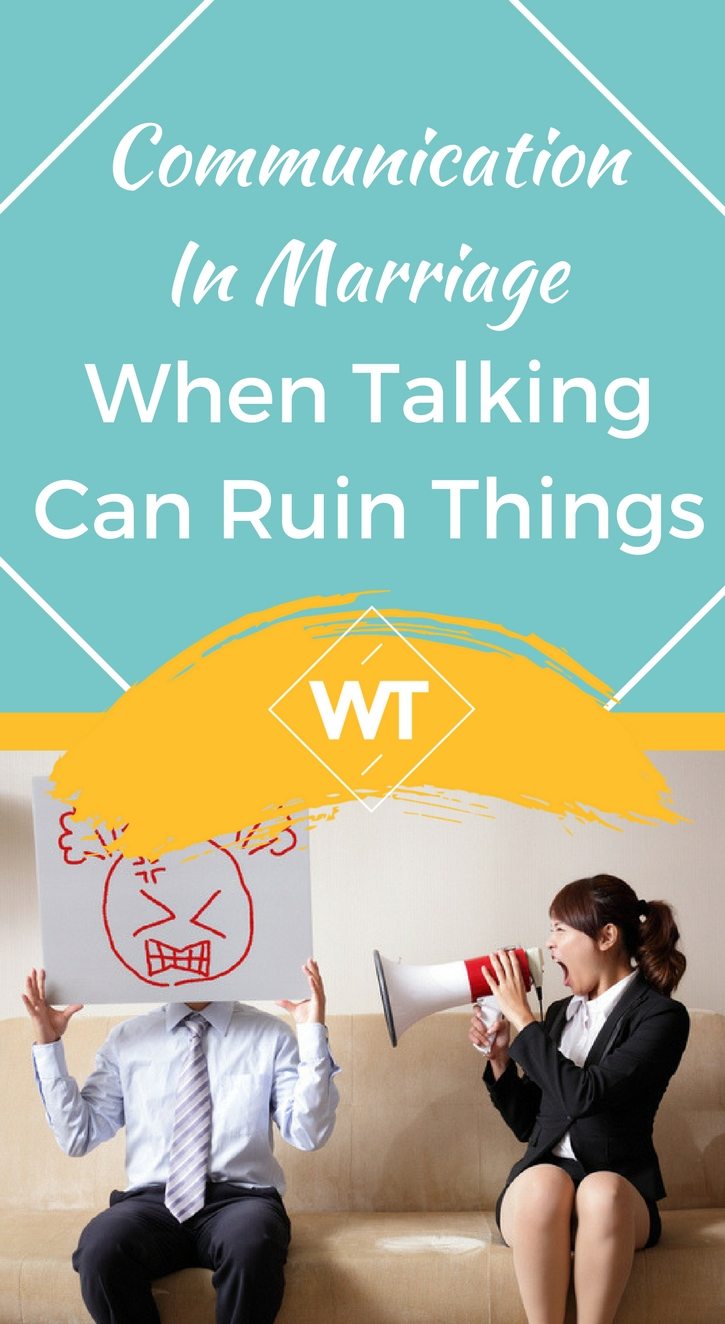Communication In Marriage: When Talking Can Ruin Things

How many times have you heard that good communication in marriage is the number one priority for a happy and successful relationship? Well, I am not going to tell you any different. Communication in marriage is, in fact, essential for happiness, but have you ever considered that talking at the wrong time could be making your communication more challenging?
When I was growing up I remember thinking that all that stuff about men and women being different was just baloney, and today I still think that stereotypes are in their majority more detrimental than useful. That said, I cannot put aside certain biological differences that have been scientifically proven on the way most men and women react to conflict. If you are finding yourself knocking heads with your spouse when trying to have a “conversation” under pressure, then you may not want to ignore them either.
When we have a discussion with our partner our logical mind understands that we are not in danger. But our brain still reacts in primitive ways, and the physiological reactions are very similar to any other social mammal facing a threat.
A woman’s brain generally reacts by looking for a coming together of the “pack.” We need to connect and reinforce the bonds. Men, on the other hand, prepare themselves for battle. Their body is ready for a fight or flight reaction.
In general, women are also faster and react more often to perceived “threats.” In the case of men, once they do react, however, they do so in a stronger manner.
This is very interesting because the same happens in most social animals including our domestic dogs. If you have male and female dogs in your home you might notice that the females are much more vocal and are the first ones to “sound the alarm” if there is anything suspicious happening. The males, conversely, tend to wait a bit longer to see if they are really needed. But if it turns out that there really is something happening, their engagement tends to be more intense.
So, being that men and women are wired to react differently when confronted with a threat and that our primal brains activate in the same manner when we are having a heated discussion, is not surprising that most of us find it so difficult to communicate with our spouses at all when we are having a disagreement.
Women want to connect and talk about the problem right away, while men prefer to either avoid it all together or they get defensive and adopt a counter point. Viscerally we are both ready to “fight.” It’s just handled differently by different sexes.
So if we try to talk while things are still heated, it all becomes a bigger mess because both parties are acting from a very primal place where Cortisol levels are high and our physiological bodies are impeding our mind’s processing of the information properly.
It becomes a vicious cycle. Think about it, you are upset because your husband left the toothpaste cap off again; you approach him already more upset than you should because last time you mentioned it he seemed to have brushed you off. He senses the “threat” in your words and retreats inside of his mind, appearing to ignore what you are telling him again. His lack of proper reaction irritates you more and you push for acknowledgment, which is all you really want… he gets defensive…now you are fighting and the whole day is ruined over a toothpaste cap. So what’s the solution then?
Communication in marriage takes many forms
We obviously cannot go through life ignoring the issues and pretending that they will just go away. Some men might love this idea but we will be ignoring the need for communication which is emotionally imperative for women (and vital for a good relationship). You see, our differences are really complementary; we need each other for balance. So we still need to talk, yes—sorry boys. But the key is really in how and when.
There are more than a few things to have in mind so you can still “talk about it” without ruining your marriage:
- Do not engage in the conversation while either one of you is feeling angry. It’s normal to be upset but make sure you can keep calm.
- Agree on a gesture or a phrase you can tell each other so that you can “pause” a conversation until your emotions have come to a balance.
- Respect each other’s needs by making sure you do give the space that is needed and that you do come back and talk about it soon afterwards. If these do not happen then you won’t trust each other next time.
- Give her the connection she needs and give him the space away from the conflict to cool down at the same time by getting closer in a different way; cuddle, hug it out, go for a walk, have sex, once you calm down and you are more connected she won’t need to talk about it as fiercely and he will be more willing to do so.
A good friend just told me that the key to a successful marriage was to argue naked. ~ Leann Rimes (Tweet this)
- Creating (or maintaining) an open channel of communication in marriage doesn’t only have to mean that you’re talking. Near 90% of what we communicate is through body language, so remember to be mindful of it.
- Ensure that your partner feels loved throughout the day so that feelings of loneliness and separation do not arise when you have a conflict (this tends to be true especially for women). Showing physical affection often and not only around sexy time can make a huge, positive difference in a relationship.
- Try seeing the problem from the other’s perspective while you are cooling off. Empathy can go a long way but it disappears when you are angry.
It is important to apply these tactics early on for a better sense of communication in marriage. Do not wait until your relationship is in crisis. Learn to properly solve the little issues so that if ever a big one arises you will be ready together.
Remember your partner is still more important to you than winning the discussion.
The goal is not really to stop fighting all together; it is to navigate disagreements in a healthy manner, learning to grow the relationship.
The aim of argument or of discussion, should not be victory but progress. ~ Joseph Joubert (Tweet this)









Leave a Reply